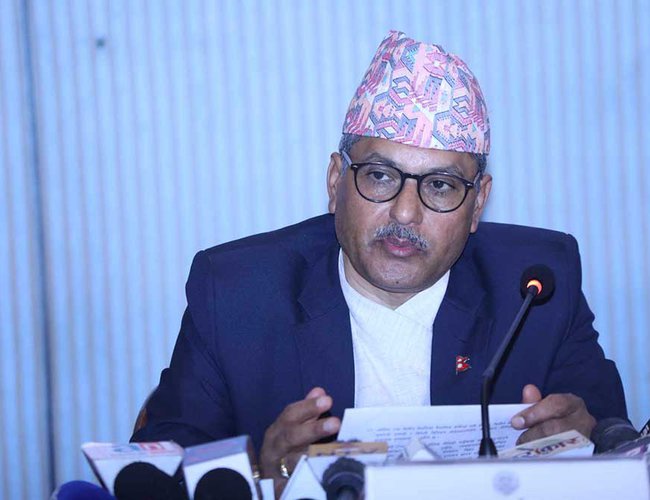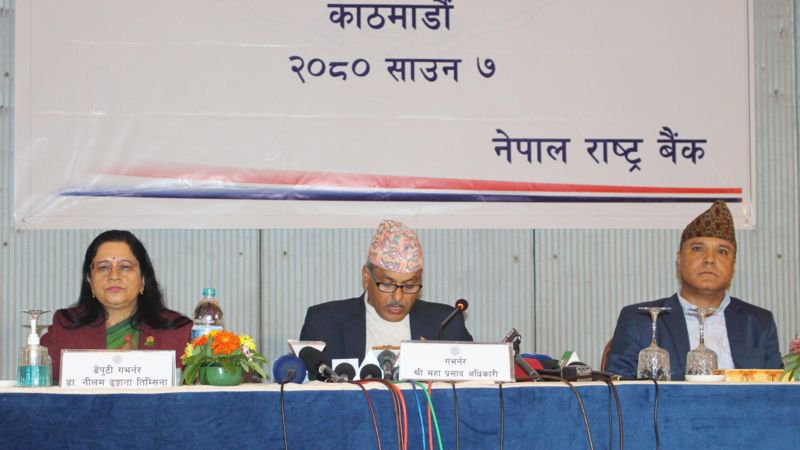
Nepal Rastra Bank has announced the monetary policy for the financial year 2080/81 on Sunday afternoon.Every year, shortly after the budget is released, the central bank releases the monetary policy.
According to the experts, monetary policy is formulated to maintain the balance of the economy by making the financial policy publicized by the government as a basis for all sectors of the economy.

Monetary policy has an impact on the interest rate that is set when a person borrows from a bank, trades or deposits in a savings bank. Likewise, the role of monetary policy is considered to be significant in controlling inflation.
Why is Nepal's financial sector under the supervision of the international community?
Why did the banks, which were setting the interest together, agree to set the interest themselves?
Some provisions of monetary policy this time
The first residential home loan limit has been increased from Rs 1.5 crore to Rs 2 crore.
Arrangements have been made to review the existing arrangements related to lending and to formulate and implement guidelines related to the internal credit risk classification of banks and financial institutions.
There is a provision in the monetary policy to form a separate regulatory body for savings and credit cooperatives.
Emphasis will be placed on electronic payment of revenue.
Nepalis going on a visit to countries other than India will be given the facility of up to 2,500 dollars by showing their passports.
The current provision that loans taken in foreign currency can be paid in Nepali currency has been removed.
The policy rate has been cut by 50 basis points to 6.5 percent.
Deposit collection rate has been reduced from 5.5 percent to 4.5 percent while keeping the bank rate unchanged at 7.5 percent.
It is mentioned in the monetary policy that monetary management will be done in order to keep the inflation within 6.5 percent so as not to put pressure on the prices due to monetary expansion.
Experts say that monetary policy is a policy that is created with the aim of strengthening the payment system by maintaining production, employment and financial stability of the country.
"Just as the government's income and expenditure and revenue rate are determined in the budget, monetary policy does similar things about financial resources," says Bhuvan Dahal, former president of Nepal Bankers Association.
According to experts, monetary policy, when interpreted generally, determines the value of the currency.
Therefore, the policy announced by the central bank indirectly affects the general consumer, producer or employee.
Why is monetary policy important?
According to the experts, monetary policy like the budget also affects the general public, so it is important.
Along with that, the various policies and regulations of the country's financial sector come into it in an integrated manner.
According to Dahal, monetary policy determines whether to lower or raise interest rates. It directly affects the general public.
“The public's biggest interest in monetary policy is interest rates. It affects borrowers as well as depositors,” said Dahal. According to Nar Bahadur Thapa, the former executive director of Nepal Rastra Bank, many people are interested in the policy to be taken on interest rates.
According to both of them, the general public is also very interested in inflation.
Thapa says, “Inflation has a direct impact on the lives of common people. Therefore, many people are interested in what policies are taken to control inflation.
Nepal Rastra Bank Governor Maha Prasad Adhikari has said that special arrangements will be made for borrowers who are in trouble due to various natural disasters.
In a press conference held here today after the announcement of the monetary policy for the current financial year, Governor Adhikari said that the borrowers who are in trouble will be rehabilitated through loan restructuring or any other special arrangements.
He informed that special arrangements are being made to raise up the borrowers who are in trouble due to natural disasters or any other disaster and to make them active again in business.
According to the Governor's official, special arrangements will be made for the re-establishment of such debtors who are in trouble due to natural calamities, due to which industries and businesses have collapsed, and are blacklisted.
He said that even though the central bank does not regularly study the remittances going out of Nepal, it is still closely monitoring them. For that, he told the plan that cooperation with other agencies and implementation of 'National Switch' will be carried out to find out the real details.
Regarding the misuse of concessional loans, the governor official said, "Concessional loans have not only been misused, but have also been put to good use. It is being studied independently. The report will come by the end of this July. Based on the same report, we will move forward." He said that if such loan is found to be misused, the interest will also be charged.
Governor Adhikari informed that the 'threshold' of loans going to share mortgages up to Rs 50 lakhs is going to be reduced.
He informed that earlier, the risk weight of share mortgage loans up to Rs. 25 lakh was 100 percent and above that, the risk weight was 150 percent. He also requested not to have any ambiguity regarding the share mortgage loan.
- India’s External Affairs Ministry’s Senior Officials Says Indo-Nepal relations are ever expanding
- Jul 05, 2025
- Bhutan Government Unveils Three Pronged Strategies To Tackle Skilled Migration Crisis
- Jul 05, 2025
- Weather Forecast: Generally Cloudy Across The Country With Heavy Rain At One Or Two Places Bagmati And Koshi Provinces
- Jul 05, 2025
- FNCCI President Dhakal Urges British Companies to Invest in Nepal
- Jul 04, 2025
- Nepal Is Expected To See 60,000 People Infected with Dengue This Year
- Jul 04, 2025















